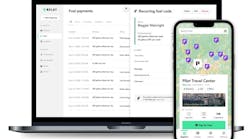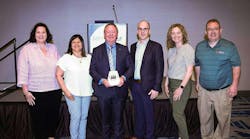The DOT Inspector General, Kenneth Mead, issued a memo recently urging the Federal Motor Carrier Administration (FMCSA) to tighten its controls over the Commercial Driver's License (CDL) process. (To read the complete text, go to www.oig.dot.gov/show._pdf.php?id=1340.)
Mead's memo focuses on a loophole in the licensing process for non-hazmat CDLs. As you'll recall, the hazmat-CDL process was revamped with enactment of the Patriot Act in 2001. Although not yet finalized, new procedures would require fingerprinting, criminal background checks and proof of citizenship or permanent legal-resident status for anyone seeking a CDL with a hazmat endorsement. (See “Safety Matters,” September 2003.)
For non-hazmat CDLs, however, there is currently no such procedure in place. Nowhere in the process are applicants required to demonstrate that they are either U.S. citizens or legal residents. They are only required to produce a Social Security Number, which does not guarantee that the bearer is in the country legally.
The DOT memo cited a recent Salt Lake City investigation which uncovered that CDL testers had actually given passing marks to applicants who were either unqualified or had defective documentation. Of 39 people indicted, over half were subsequently identified as being in the U.S. illegally.
Following a 2002 DOT audit, FMCSA had planned to close this loophole with a rulemaking that was scheduled for October 2003. That deadline has clearly come and gone. According to Mead's memo, the FMCSA agenda indicates that the rulemaking has been delayed until May 2005.
Yes, FMCSA has a lot on its plate right now, including the recent Court ruling against the new hours-of-service rules, the delay in highway funding reauthorization, and the need for better safety data from the states.
But there are consequences to putting a fix for this CDL loophole on the back burner. Suppose, for example, the 19 people mentioned earlier were able to obtain non-hazmat CDLs? And suppose they were part of a larger plot to cause us maximum harm using our freight distribution system? The possibilities are numerous.
In light of this vulnerability, what should fleet managers do? First, we should realize that CDL licensing “process enhancement” regulations require a great deal of time and effort. Remember, safeguards for the hazmat CDL process are still not in place. It's a huge task, and one that involves state licensing agencies and motor carriers, as well as background checks and fingerprinting of 3-million hazmat CDL holders. Fixing the second loophole means implementing a proof of legal residence process for 11-million non-hazmat CDL holders.
Next, we need to understand that FMCSA is navigating new regulatory waters. The creation of the Dept. of Homeland Security and Transportation Security Administration means that new power-sharing and oversight processes are being implemented on a daily basis. With each new unified oversight policy, agency staffers must understand how to work within the specified chain of command.
Last, don't assume that a valid CDL is proof that the holder is in the country legally. Recent cases confirm that the unscrupulous can and do obtain both hazmat and non-hazmat CDLs. I encourage each of you to be vigilant in your hiring processes. Such increased vigilance might include more thorough employment background checks, as well as standard criminal checks on all applicants, until the loopholes in the CDL rules are closed.
I'm sure you wouldn't want to be the fleet that hired someone whose real motive was to use a truck as a weapon.
Jim York is the manager of Zurich Service Corp.'s Risk Engineering Transportation Team, based in Schaumburg, IL.


